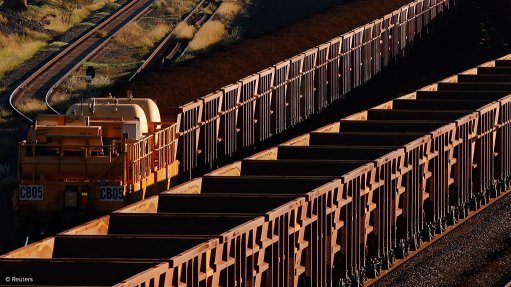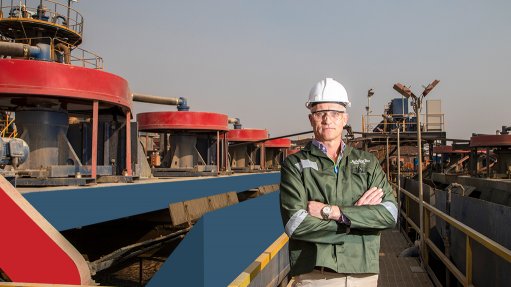Barrick ad campaign counters Dominican criticism
SANTO DOMINGO (miningweekly.com) – Canada-based Barrick Gold has started a media campaign in the Dominican Republic to counter often repeated, but false, statements about its 2009 contract to develop the $4-billion Pueblo Viejo gold mine.
Pueblo Viejo, which is 60% owned by operator Barrick and 40% by Canada-based Goldcorp, is the largest foreign investment in the Dominican Republic. It started production in January and is expected to account for as much as 15% of Dominican exports over the next decade.
However, during the past two weeks Dominican legislators – including from the ruling PLD party – have requested that the contract be revised as a result of the increase in international gold prices since the contract was negotiated.
"We expect their executives to make a move so that the government and Barrick examine the contract [and] that they sit with the government to find a solution that benefits the country,” Abel Martinez, the head of the Dominican congress, said last week. “But this revision is urgent and the Chamber of Deputies has made the firm decision to act in this regard.”
Alexander Medina, the head of the government’s mining agency, last week also joined the ranks of those demanding a contract revision.
The increased calls for a revised contract come as Dominican President Danilo Medina is struggling with a record public deficit due to overspending by his predecessor last year and a refusal to make any significant cuts in public spending this year, opting instead for an unpopular tax increase that went into force in January.
The same day Barrick started its media campaign, an official claimed that the Dominican Republic was only receiving “a pittance for the mining exploitation.” Federico Antun Battle, who heads the government development bank for production and housing, told Color Vision TV that the government should not give away its natural resources to foreign companies.
However, in the ad that appeared February 11, Barrick clearly states that the Dominican government will receive 50% of the mine’s benefits. Barrick and Goldcorp will pay the Dominican government a 3.2% royalty, 25% corporate tax and 28.75% of the net profits.
In addition, Pueblo Viejo has spent 56-billion pesos ($1.4-billion) on purchases from some 400 local companies and has allocated more than 700-million pesos for corporate social responsibility projects, the ad points out.
Pueblo Viejo also offered to invest $75-million in remedial efforts to clean up the environmental damage from the previous owner, the ad says.
One of the myths Barrick is countering in its media campaign is that the contract was negotiated and approved by legislators in a rush and with little transparency. The contract was an amendment to an existing contract between the Dominican government and Placer Dome, which Barrick acquired in 2006.
“The process of applying, analysis, negotiation, revision, signing and ratification of the amendment took 27 months,” Barrick says in an ad that appeared in local newspaper Diario Libre today.
“From the start of the discussions until the signing of the contract amendment it took 22 months… The executive signed the contract amendment into law after five months in the national congress. The government was advised the French Bureau of Geology and Mining (BRGM) and specialised consultants from Chile and Peru hired by the Inter-American Development Bank.”
The ad yesterday also countered the lack of transparency by pointing out that Barrick is publicly traded in the US and Canada following “the strictest norms on rules, transparency of information and controls.”
“These two pieces will be followed by daily publications around the different topics on [Pueblo Viejo], economic contributions to the country, social investment, environment reclamations, etc,” Pueblo Viejo spokesperson Jorge Esteva told Mining Weekly Online.
Despite the increased talks of revising the contract, it is unclear what options the Dominican government has.
“We are very confident in the integrity of the agreement we have in place,” Barrick spokesperson Andy Lloyd said. “The contract was approved in 2009 by both houses of congress and later ratified by the executive branch. It is legally binding on both the company and the state and cannot be changed unilaterally by either party. However, Barrick views the Government of the Dominican Republic as a partner and is always willing to discuss in good faith the circumstances of the company's operations in the country.”
Last week, the PRSC congressional leader Ramón Rogelio Genao suggested that the government should press its demands on Barrick by following a policy used in 1986 by then-President Joaquin Balaguer (of the PRSC party) who stopped shipments from miner Falconbridge at the ports until they agreed to review their contract.
In addition to the officials and legislators seeking a revision, various groups – including the Dominican Lawyers Association and the Justice and Transparency Foundation– have called for revising the contract.
The increased talk about a revised contract has been harshly criticised by foreign investors. Salvador Demallistre, executive director of the Dominican Association of Foreign Investors (ASIEX), said the rules of the game should not be changed. He also defended the original contract as the best possible one the Dominican Republic could have negotiated. Meanwhile, William Malamud, executive VP of the American Chamber of Commerce in the Dominican Republic, said a possible revision sends a negative signal to other investors in the mining sector.
In addition to Barrick Gold and Goldcorp, Xstrata Nickel’s unit Falcondo is developing a ferronickel surface mine and is currently awaiting approval from the Dominican environmental ministry for its Loma Miranda project, which will add another 20 years to its operation. A third significant project, the Cerro de Maimon gold and copper mine, is being developed by Corporacion Minera Dominicana (Cormidorm), a 60/40% joint venture between two companies from China and Australia.
Several other junior firms are also active, but without any major developments so far. According to mining director Medina, the Dominican Republic has proven mineral and metal reserves worth a total of $60- billion.
Comments
Press Office
Announcements
What's On
Subscribe to improve your user experience...
Option 1 (equivalent of R125 a month):
Receive a weekly copy of Creamer Media's Engineering News & Mining Weekly magazine
(print copy for those in South Africa and e-magazine for those outside of South Africa)
Receive daily email newsletters
Access to full search results
Access archive of magazine back copies
Access to Projects in Progress
Access to ONE Research Report of your choice in PDF format
Option 2 (equivalent of R375 a month):
All benefits from Option 1
PLUS
Access to Creamer Media's Research Channel Africa for ALL Research Reports, in PDF format, on various industrial and mining sectors
including Electricity; Water; Energy Transition; Hydrogen; Roads, Rail and Ports; Coal; Gold; Platinum; Battery Metals; etc.
Already a subscriber?
Forgotten your password?
Receive weekly copy of Creamer Media's Engineering News & Mining Weekly magazine (print copy for those in South Africa and e-magazine for those outside of South Africa)
➕
Recieve daily email newsletters
➕
Access to full search results
➕
Access archive of magazine back copies
➕
Access to Projects in Progress
➕
Access to ONE Research Report of your choice in PDF format
RESEARCH CHANNEL AFRICA
R4500 (equivalent of R375 a month)
SUBSCRIBEAll benefits from Option 1
➕
Access to Creamer Media's Research Channel Africa for ALL Research Reports on various industrial and mining sectors, in PDF format, including on:
Electricity
➕
Water
➕
Energy Transition
➕
Hydrogen
➕
Roads, Rail and Ports
➕
Coal
➕
Gold
➕
Platinum
➕
Battery Metals
➕
etc.
Receive all benefits from Option 1 or Option 2 delivered to numerous people at your company
➕
Multiple User names and Passwords for simultaneous log-ins
➕
Intranet integration access to all in your organisation


















